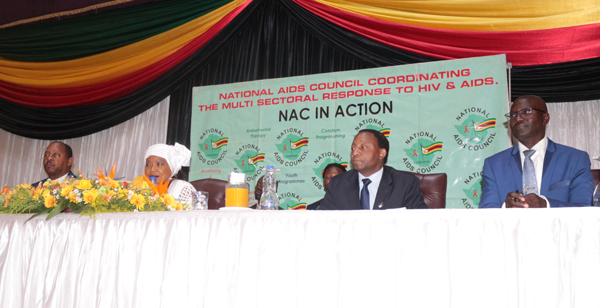
By STYLE REPORTER
First Lady Auxillia Mnangagwa last Tuesday met men in one of her engagements aimed at putting national focus on health issues, including HIV and Aids.
The Tuesday meeting, dubbed the Men’s Conference, was made possible by the National Aids Council in partnership with the Health and Child Care ministry. The first lady, who is the health and child care ambassador, has indicated that she will champion programmes aimed at reducing HIV and Aids in the country.
Zimbabwe has an estimated 1,3 million people living with HIV and about 5,5% are reported to be children under the age of 15 years while women constitute 59%.
However, the country is making headway in meeting the United Nations’ 90-90-90 ambitious target to help end the HIV and Aids pandemic.
It is clear that effective investments in prevention of new HIV infections need to be accompanied by investment in gender and culture transformative approaches in order to overcome barriers to the uptake of health services, hence the convening of the Men’s Conference, which was attended by close to 500 men representing different groups.
Speaking at the meeting, the first lady said men are a hard-to-reach population in health behaviour programmes, including HIV prevention programmes, which derails efforts of reducing HIV and Aids in the country.
“Statistics indicate that fewer men than women make use of available HIV prevention and health services in general. All service areas indicate higher uptake by women and it appears to me that some men use their partners as proxies for their own health,” she said.
- Chamisa under fire over US$120K donation
- Mavhunga puts DeMbare into Chibuku quarterfinals
- Pension funds bet on Cabora Bassa oilfields
- Councils defy govt fire tender directive
Keep Reading
“It also appears to me that most men have a challenge with health seeking either because you were brought up to be ‘strong’ or just that you have your own unresolved fears.
“With a positive health seeking behaviour, you should feel alright about openly seeking HIV testing and utilising the broad range of HIV combination prevention services available to you, which include condoms, voluntary medical male circumcision, prevention and treatment of sexually transmitted infections, and prevention of mother to child transmission among others.
“You can be a positive force for social and health revolution in your families and communities. As a nation we can sustain and increase our gains in HIV prevention, treatment and control of non-communicable diseases if all men commit to being agents of social change and health revolution.”
The first lady said she was happy that in rural areas some traditional leaders were encouraging husbands to accompany their wives for antenatal care.
“I have heard encouraging stories of some chiefs who demand that pregnant women should be accompanied by their husbands or partners, failure of which the man must pay a fine,” she said.
“We do not have chiefs here in town, but I am sure we can find other ways to motivate men to actively and openly participate in the health of their families.”
The first lady said apart from HIV and Aids, the country was also losing men to non-communicable diseases.
“As a nation we have made some tremendous progress in HIV and Aids prevention and treatment, but there is a danger in town! Once again because of a poor health seeking behaviour, we are losing more and more men to non-communicable diseases such as prostate and lung cancers, diabetes, blood pressure and others,” she said.
“All these diseases are preventable and can be cured if health care is sought early, but unfortunately most of you wait until it is too late. I want to encourage the Ministry of Health and Child Care and the National Aids Council to scale up men mobilisation and prevention services for non-communicable diseases for men. Maybe we need veritable approaches such as peer education and mass media campaigns to raise awareness levels.”
Health and Child Care minister Obadiah Moyo said the generally low uptake of health services by men was a cause for concern.
“We are worried as a ministry about the generally low uptake of health services by men, largely on account of a low health seeking behaviour,” Moyo said.
“Data from several health indicators, including HIV testing, STI treatment, anti-retroviral therapy, tuberculosis treatment, cancer screening and treatment, attendance at outpatients’ wards and others show that fewer men compared to women are forthcoming about their own health and that of their families.
He said the Men’s Conference was a deliberate campaign to ensure that men seek and utilise the wide array of available health services.











